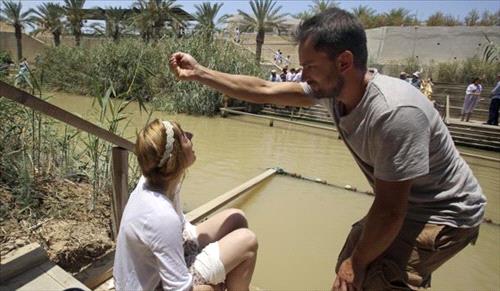Ammon News - AMMONNEWS - For years, Christian pilgrims have waded into the Jordan River from both its eastern and western banks to connect with a core event of their faith — the baptism of Jesus.
The parallel traditions allowed Jordan and Israel to compete for tourism dollars in marketing one of Christianity’s most important sites.
But now UNESCO has weighed in on the rivalry, designating Jordan’s baptismal area on the eastern bank a World Heritage site.
The U.N. cultural agency declared this month that the site “is believed to be” the location of Jesus’ baptism, based on what it said is a view shared by most Christian churches.
The decision drew cheers in Jordan, where the number of tourists has dropped sharply since the 2011 Arab Spring and the rise of the Islamic State group.
Israel has kept silent while a Palestinian official said the western baptismal site, located in an Israeli-occupied area sought for a Palestinian state, should have been included.
The UNESCO decision also raised eyebrows among some scholars.
It “has nothing to do with archaeological reality,” said Jodi Magness, an archaeologist at the University of North Carolina at Chapel Hill. “We don’t have any sites with evidence or archaeological remains that were continuously venerated from the first century on.”
Experts who reviewed the Jordanian application for UNESCO acknowledged that there is no solid archaeological evidence confirming that “Bethany Beyond the Jordan,” also known as al-Maghtas, Arabic for baptism, is the authentic site.
However, the Jordanian site is of “immense religious significance to the majority of denominations of Christian faith, who have accepted this site as the location” of Jesus’ baptism, the experts wrote in their recommendation.
Jesus’s baptism is recounted in New Testament passages as the beginning of his ministry. Only John 1:28 hints at a possible location, the eastern bank: “These things were done in Bethany beyond the Jordan, where John was baptizing.”
The debate over the baptism site comes at a time of regional turmoil, including the rising threat from Islamic militants who have destroyed ancient artifacts.
Jordan’s tourism minister, Nayef al-Fayez, told UNESCO that Jordan is sending a message of tolerance. The kingdom’s Hashemite rulers “who are the direct descendants of the Prophet Muhammad … are the same ones who are protecting one of the holiest sites of Christianity,” he said.
The Israeli-Palestinian conflict also looms in the background.
The Israeli-run site, known as Qasr al-Yahud, is located in the West Bank, one of three territories captured by Israel in the 1967 Mideast war and sought by the Palestinians for a state. The baptism site is in a part of the West Bank that remains under full Israeli military occupation.
*AP
